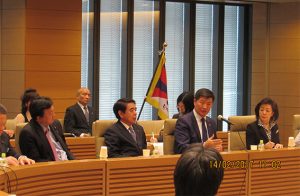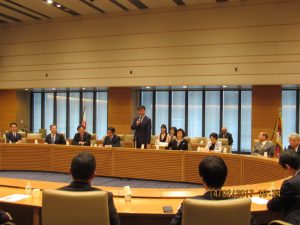
Sikyong Dr Lobsang Sangay addressing the members of the Japanese Parliament at the National Diet building in Tokyo
Photo: tibet.net
Sikyong Dr Lobsang Sangay, the Prime Minister of Tibet’s government-in-exile, arrived in Japan on February 4 for a two week diplomatic tour that included talks with Japanese parliamentarians, visits to educational and monastic institutions, and public speeches on Tibet issues.
In his speeches, Sikyong discussed the current situation in Tibet, the way forward to resolve the issue of Tibet, why Tibet matters for Asia and the world, and the implications of Donald Trump’s election as United States president for the “Middle Way” approach, which has been pursued by the exiled government in Dharmshala, India, since the 1970s.
Sikyong said that countries opposed to Chinese expansion could learn about Chinese methods by studying the situation in Tibet:
“China’s scheme to expansion through building infrastructure, entertainment hubs and cooperating with leaders of other countries in recent days were used prior and during their invasion of Tibet.”
Sikyong expressed confidence that US support for Tibet would not falter under President Trump. He pointed to a statement from new US Secretary of State Rex Tillerson, who recently encouraged dialog between Beijing and representatives of Tibet’s government-in-exile.

Sikyong addressing the members of the Japanese Parliament Photo: tibet.net
Referring to his administrations five-fifty strategy, Sikyong called for a renewed effort in the Tibetan people’s struggle to seek genuine autonomy in the next five years whilst also working to strengthen and sustain the Tibetan movement over the next 50 years.
Speaking of efforts to reconstruct Buddhist temples in Tibet destroyed during the Cultural Revolution, Sikyong said that all the major monasteries had been rebuilt brick by brick, “That is the spirit of the Tibetan people”, he declared, “no matter how much you destroy us, we will rise up again and again”.
In his talks Sikyong also covered the matter of the Dalai Lama’s reincarnation, stating that only Tibetans have the right to recognise this and that the Chinese government could in no way influence the succession process.
This was Sikyong’s third visit to Japan following previous trips in 2012 and 2016. Before his election in 2012, Japanese Prime Minister Shinzo Abe said “we want to help the Tibetan people and help create a Tibet in which people do not have to kill themselves in a quest for freedom”.




 Print
Print Email
Email